1996 Summer Olympics
| Games of the XXVI Olympiad | |
|---|---|
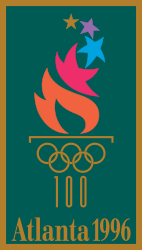 |
|
| Host city | Atlanta, Georgia, USA |
| Motto | The Celebration of the Century |
| Nations participating | 197 |
| Athletes participating | 10,320 (6,797 men, 3,523 women) |
| Events | 271 in 26 sports |
| Opening ceremony | July 19 |
| Closing ceremony | August 4 |
| Officially opened by | President Bill Clinton |
| Athlete's Oath | Teresa Edwards |
| Judge's Oath | Hobie Billingsley |
| Olympic Torch | Muhammad Ali |
| Stadium | Centennial Olympic Stadium |
The 1996 Summer Olympics of Atlanta, officially known as the Games of the XXVI Olympiad and unofficially known as the Centennial Olympics, was an international multi-sport event which was celebrated in 1996 in Atlanta, Georgia, United States.
Contents |
Selection
Atlanta was selected on September 18, 1990 in Tokyo, Japan, over Athens, Belgrade, Manchester, Melbourne and Toronto. Atlanta's bid to host the Summer Games that began in 1987 was considered a long-shot, since the U.S. had hosted the Summer Olympics just 3 years earlier in Los Angeles. Atlanta's main rivals were Toronto, whose front running bid that began in 1986 seemed almost sure to succeed after Canada had held a successful 1988 Winter Olympics in Calgary and Melbourne, Australia, who hosted the 1956 Summer Olympics and felt that the Olympic Games should return to Australia. The Athens bid was based on sentiment, the fact that these Olympic Games would be the 100th Anniversary of the first Summer Games in Greece in 1896.
The chart's information below comes from the International Olympic Committee Vote History web page, regarding the cities that bid for the 1996 Olympic Games. The vote occurred at the 96th IOC Session in Tokyo, Japan.
| 1996 Summer Olympics Bidding Results | ||||||
|---|---|---|---|---|---|---|
| City | NOC Name | Round 1 | Round 2 | Round 3 | Round 4 | Round 5 |
| Atlanta | 19 | 20 | 26 | 34 | 51 | |
| Athens | 23 | 23 | 26 | 30 | 35 | |
| Toronto | 14 | 17 | 18 | 22 | - | |
| Melbourne | 12 | 21 | 16 | - | - | |
| Manchester | 11 | 5 | - | - | - | |
| Belgrade | 7 | - | - | - | - | |
Effect on the city
The city of Atlanta had to pay for staging the games. Many in the metro area consider the Games to be instrumental in transforming Atlanta into a modern city. One instance is the mid-rise dormitories built for the Olympic Village, as one of these complexes became the first residential housing for Georgia State University, and has recently been transferred for use by the Georgia Institute of Technology. Another example is Centennial Olympic Stadium, which by design was later converted into the baseball-specific Turner Field for the Atlanta Braves after the Games concluded, as there was no long-term need for a track and field venue in the city. Centennial Olympic Park was also built for the events and is still in use.
The Atlanta Olympics followed the model established by the 1984 Olympic Games in Los Angeles. The cost to stage the Games was US$1.8 billion. Governmental funds were used for security, and around $500 Million of taxpayer money was used on the physical infrastructure including streetscaping, road improvements, the Centennial park, expansion of airport, improvements in public transportation, and redevelopment of public housing projects[1] but neither paid for the actual Games and the new Venues themselves.[2] To pay for the games, Atlanta relied on commercial sponsorship and ticket sales, resulting in a profit of $10 million.[3]
Incidents
Atlanta's heavy reliance on corporate sponsorship caused many to consider the Games to be overly commercialized. Coca-Cola, whose corporate headquarters is in Atlanta, received criticism for being the exclusive drink offered in Olympic venues. In addition, the city of Atlanta was found to have been competing with the IOC for advertising and sponsorship dollars. The city licensed street vendors who sold certain products over others, and therefore provided a presence for companies who were not official Olympic sponsors.[4][5] In defense, the organizing committee stated the heavy corporate sponsorship was part of America's culture of capitalism.[4]
A report prepared by European Olympic officials after the Games was critical of Atlanta's performance in several key issues, including the level of crowding in the Olympic Village, the quality of available food, the accessibility and convenience of transportation, and the Games' general atmosphere of commercialism.[6] The opening ceremony, featuring 500 cheerleaders and 30 pickup trucks, was also seen as "garish" by some observers and considered questionable in taste by many foreign visitors, and many American spectators claim it had nothing to do with American culture (despite cheerleading being a staple American college activity and pickup trucks being an American invention).[7]
The Atlanta Olympics were marred by the Centennial Olympic Park bombing on July 27. This bombing killed spectator Alice Hawthorne and wounded 111 others, and caused the death of Melih Uzunyol by heart attack. Eric Robert Rudolph was charged with and confessed to this bombing and several others. He is now in a US Federal prison.
At the closing ceremony, IOC President Juan Antonio Samaranch said in his closing speech, "Well done, Atlanta" and simply called the Games "most exceptional." This broke precedent for Samaranch, who had traditionally labeled each Games "the best Olympics ever" at each closing ceremony, a practice he resumed at the subsequent Games in Sydney in 2000.[8]
Songs and themes
The Olympiad's official theme, "Summon the Heroes," was written by John Williams, making it the third Olympiad for which he has composed. The song "The Power of the Dream", composed by Kenneth "Babyface" Edmonds and David Foster, with words by Linda Thompson was performed in the opening ceremony by Céline Dion accompanied by Foster and the Atlanta Symphony Orchestra and Centennial Choir. Gladys Knight sang "Georgia on My Mind", Georgia's official state song, at the opening ceremony. The closing ceremony featured Gloria Estefan singing "Reach", the official theme song of the 1996 Olympics. At the closing of the ceremony Trisha Yearwood performed the Olympics song.
Mascot
The mascot for the Olympiad was an abstract, animated character named Izzy. In contrast to the standing tradition of mascots of national or regional significance in the city hosting the Olympiad, Izzy was an amorphous, fantasy figure.
Highlights
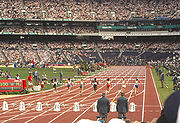
A record 197 nations, all current IOC member nations, took part, with a record 79 of them winning at least one medal. Palestine was allowed to compete in the Olympics for the first time. Also for the first time, Olympic medals were won by the athletes from Armenia, Azerbaijan, Belarus, Burundi, Ecuador, Georgia, Hong Kong, Kazakhstan, Moldova, Mozambique, Slovakia, Tonga, Ukraine, and Uzbekistan. Lee Lai Shan won a gold medal in sailing, the only Olympic medal that Hong Kong ever won as a British colony (1952–1997). This meant that for the only time, the colonial flag of Hong Kong was raised to the accompaniment of the British national anthem God Save the Queen, as Hong Kong's sovereignty was later transferred to China in 1997.
Softball, beach volleyball and mountain biking debuted on the Olympic program, together with women's soccer/football and lightweight rowing.
- Muhammad Ali lit the Olympic torch during the opening ceremonies of the games and received a replacement gold medal for his boxing victory in the 1960 Summer Olympics.
- Kurt Angle of the United States won the gold medal in 100 kg (220 lb) freestyle wrestling. He competed with a broken neck. After the 96' Olympic Games he pursued a career in "Sports Entertainment" style wrestling competing for both World Wrestling Entertainment and TNA
- Slovene gymnast Leon Štukelj arose at the opening ceremony as one of the oldest living sportsmen in the world (age 97)
- Naim Süleymanoğlu became the first weightlifter to win three gold medals.
- Donovan Bailey of Canada won the men's 100 m, setting a new world record of 9.84 seconds at that time. He also anchored his team's gold in the 4x100 m relay.
- Michael Johnson won gold in both the 200 m and 400 m, setting a new world record of 19.32 seconds in the 200 m. Johnson afterward began disputing Bailey's unofficial title as the "world's fastest man", which later culminated in a 150-metre race between the two to settle the issue.
- Marie-José Pérec equaled Johnson's performance, although without a world record, by winning the rare 200 m/400 m double.
- Carl Lewis won his 4th long jump gold medal at the age of 35.
- Cycling professionals were admitted to the Olympics, with five-time Tour de France winner Miguel Indurain winning the inaugural individual time trial event.
- Michelle Smith of Ireland won three gold medals and a bronze in swimming. She remains her nation's most decorated Olympian. However, her victories were overshadowed by doping allegations even though she did not test positive in 1996. She received a four-year suspension in 1998 for tampering with a urine sample, though her medals and records were allowed to stand.
- Kerri Strug of the United States women's gymnastics team vaulted with an injured ankle and landed on one foot. The US women's gymnastics team won its first gold medal.
- Shannon Miller of the United States won the gold medal on the balance beam event. The first time an American Gymnast had won an individual gold medal outside of a contested Olympic games.
- Amy Van Dyken won four gold medals in the Olympic swimming pool, the first American woman to win four titles in a single Olympiad.
- Deon Hemmings became the first woman to win an Olympic gold medal for Jamaica and the English-speaking West Indies.
- Five athletes were disqualified for using banned drugs. A few of these athletes were reinstated since the drug they took had been declared illegal only a week before the Olympics.
- Andre Agassi won the gold medal in tennis. This helped him become the first male player to ever win the career Golden Slam.
- Deng Yaping of China won two gold medals in Women singles and doubles of table tennis. She also won these two titles in the 1992 Barcelona Olympics.
- The US women's soccer team won the gold medal in the first ever women's soccer event.
- Xeno Müller won gold for the Men's single scull event (rowing) in his first Olympic appearance. His time of 6:44.85 is still the current Olympic record.
- Alexander Karelin won his third Olympic gold medal as a Greco-Roman wrestler.
- Spain won gold at the inaugural rhythmic gymnastics team competition defeating the favorite and reigning world champion Bulgaria who had won the World Championship less than a month before.
Venues
Events of the Atlanta Games were held in a variety of areas. A number were held within the Olympic Ring, a three-mile circle from the center of Atlanta. Others were held at Stone Mountain, about 20 miles outside of the city. To broaden ticket sales, other events, such as soccer, occurred in various cities in the southeast (see below).[9][10]
Inside the Olympic Ring
- Centennial Olympic Stadium (Now known as Turner Field) – Opening/Closing Ceremonies, Athletics
- Georgia Dome – Basketball, Artistic Gymnastics, Handball
- Georgia Tech Aquatic Center – Swimming, Diving, Synchronized Swimming, Water Polo
- Atlanta-Fulton County Stadium – Baseball
- Georgia World Congress Center – Handball, Fencing, Judo, Table Tennis, Weightlifting, Wrestling
- Omni Coliseum – Volleyball
- Panther Stadium – Field Hockey
- Herndon Stadium – Field Hockey
- Georgia State University Sports Arena – Badminton
- Forbes Arena (Morehouse College) – Basketball
- Alexander Memorial Coliseum – Boxing
Elsewhere in metropolitan Atlanta
- Stone Mountain Tennis Center (at Stone Mountain, Georgia) – Tennis
- Stone Mountain Park Archery Center – Archery
- Stone Mountain Park Velodrome – Cycling-Track
- Atlanta Beach (Jonesboro, Georgia) – Beach Volleyball (now known as The BEACH)
- Wolf Creek Shooting Complex – Shooting
- Georgia International Horse Park (Conyers, Georgia) – Equestrian, Cycling-Mountain Bike
- Lake Lanier (Near Gainesville, Georgia) – Rowing, Canoeing/kayak (Sprint)
Other venues
- Sanford Stadium (Athens, Georgia) – Football (Soccer)
- Stegeman Coliseum (Athens, Georgia) – Volleyball, Rhythmic Gymnastics
- Savannah River (at Savannah, Georgia) – Yachting
- Ocoee River (Polk County, Tennessee) – Canoeing/kayak (slalom)
- Golden Park (Columbus, Georgia) – Softball
- Legion Field (Birmingham, Alabama) – Football
- RFK Stadium (Washington, D.C.) – Football
- Citrus Bowl (Orlando, Florida) – Football
- Miami Orange Bowl (Miami, Florida) – Football
After the Olympics, Centennial Olympic Stadium was converted into Turner Field, which became home of the Atlanta Braves baseball team for the 1997 season. Once the Braves moved, Atlanta-Fulton County Stadium was demolished, and the site became a parking lot for Turner Field; the Omni was demolished that same year to make way for Philips Arena on its site. The only other Olympic venue to be closed since has been the Miami Orange Bowl, demolished in 2008 for the Florida Marlins' new baseball stadium to be built on its site.
Sports
|
|
|
Participating nations
Blue = Participating for the first time. Green = Have previously participated. Yellow square is host city (Atlanta)

A total of 197 nations were represented at the 1996 Games, and the combined total of athletes was about 10,318.[11] Twenty-four countries made their Olympic debut this year, including eleven of the ex-Soviet countries that competed as part of the Unified Team in 1992. Russia competed independently for the first time since 1912, when it was the Russian Empire. The Federal Republic of Yugoslavia competed as Yugoslavia.
The 14 countries making their Olympic debut were: Azerbaijan, Burundi, Cape Verde, Comoros, Dominica, Guinea-Bissau, Macedonia, Nauru, Palestine, Saint Kitts and Nevis, Saint Lucia, São Tomé and Príncipe, Tajikistan and Turkmenistan.
The 10 countries making their Summer Olympic debut (after competing at the 1994 Winter Olympics in Lillehammer) were: Armenia, Belarus, Czech Republic, Georgia, Kazakhstan, Kyrgyzstan, Moldova, Slovakia, Ukraine and Uzbekistan. The Czech Republic and Slovakia attended the games as independent nations for the first time since the break up of Czechoslovakia, while the rest of the nations that made their Summer Olympic debut were formerly part of the Soviet Union.
|
|
|
|
Broadcast rights
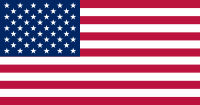 United States: NBC
United States: NBC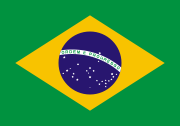 Brazil: Rede Globo, Rede Record, SBT, Rede Bandeirantes, Rede Manchete, Sportv, and ESPN Brasil
Brazil: Rede Globo, Rede Record, SBT, Rede Bandeirantes, Rede Manchete, Sportv, and ESPN Brasil Australia: Australian Broadcasting Corporation, Special Broadcasting Service, Seven Network, Nine Network, and Network Ten
Australia: Australian Broadcasting Corporation, Special Broadcasting Service, Seven Network, Nine Network, and Network Ten Indonesia: TVRI, RCTI, SCTV, TPI, ANTV, and Indosiar. Jakarta Television Cable: Indovision, IM2 Pay TV, M2V Mobile TV, and Kabel Vision. and Owner Stations By ; Global Mediacom, PT MNC Skyvision, Grup Salim, PT Cipta Lamtoro Gung Persada, Grup Bakrie, PT Bimantara Citra, and Para Group.
Indonesia: TVRI, RCTI, SCTV, TPI, ANTV, and Indosiar. Jakarta Television Cable: Indovision, IM2 Pay TV, M2V Mobile TV, and Kabel Vision. and Owner Stations By ; Global Mediacom, PT MNC Skyvision, Grup Salim, PT Cipta Lamtoro Gung Persada, Grup Bakrie, PT Bimantara Citra, and Para Group. China: China Central Television, Beijing Television Station, Shanghai Media Group, Tianjin Television, Chongqing Television, Fujian Television, and Shenzhen Media Group
China: China Central Television, Beijing Television Station, Shanghai Media Group, Tianjin Television, Chongqing Television, Fujian Television, and Shenzhen Media Group Singapore: Television Corporation of Singapore, and StarHub TV
Singapore: Television Corporation of Singapore, and StarHub TV Brunei: Radio Television Brunei
Brunei: Radio Television Brunei Hong Kong: ATV, TVB, Cable TV Hong Kong, NOW TV, HKBN bbTV, Pay Vision, Star TV, and Phoenix Television
Hong Kong: ATV, TVB, Cable TV Hong Kong, NOW TV, HKBN bbTV, Pay Vision, Star TV, and Phoenix Television Taiwan: Taiwan Television:TTV, TTV Family, TTV Finance, TTV Health, China Television:CTV, CTV News Channel, CTV MyLife, Chinese Television System:CTS, CTS Education and Culture, CTS Recreation, CTS News, Formosa TV: FTV, FTV News, Follow Me TV, Public Television Service: PTS, Dimo TV, HiHD, Sanlih E-Television, Gala Television, Era Television, TVBS, Chung T'ien Television, Eastern Television, Videoland Television Network, Unique Satellite TV, STAR TV, Taiwan Broadcasting System, and HBO Asia
Taiwan: Taiwan Television:TTV, TTV Family, TTV Finance, TTV Health, China Television:CTV, CTV News Channel, CTV MyLife, Chinese Television System:CTS, CTS Education and Culture, CTS Recreation, CTS News, Formosa TV: FTV, FTV News, Follow Me TV, Public Television Service: PTS, Dimo TV, HiHD, Sanlih E-Television, Gala Television, Era Television, TVBS, Chung T'ien Television, Eastern Television, Videoland Television Network, Unique Satellite TV, STAR TV, Taiwan Broadcasting System, and HBO Asia Japan: NHK: NHK General TV, NHK Educational TV), NNN: Nippon TV, JNN: TBS TV, MBS TV, FNN: Fuji TV, ANN: TV Asahi, TXN: TV TOKYO, TOKYO MX, and Open University
Japan: NHK: NHK General TV, NHK Educational TV), NNN: Nippon TV, JNN: TBS TV, MBS TV, FNN: Fuji TV, ANN: TV Asahi, TXN: TV TOKYO, TOKYO MX, and Open University Malaysia: Radio Televisyen Malaysia, Media Prima Berhad, and Astro (satellite TV)
Malaysia: Radio Televisyen Malaysia, Media Prima Berhad, and Astro (satellite TV) India: Zee Network, STAR TV, and Sahara One
India: Zee Network, STAR TV, and Sahara One Ireland: RTÉ
Ireland: RTÉ Italy: RAI
Italy: RAI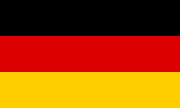 Germany: ARD, ZDF, and DWTV
Germany: ARD, ZDF, and DWTV Great Britain: BBC
Great Britain: BBC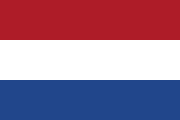 Netherlands: Nederlandse Omroep Stichting
Netherlands: Nederlandse Omroep Stichting Philippines: PTV and SkyCable
Philippines: PTV and SkyCable Canada: CBC
Canada: CBC.svg.png) Belgium: BRTN
Belgium: BRTN Chile: TVN, UCTV
Chile: TVN, UCTV Poland: TVP
Poland: TVP Switzerland: SRG SSR idee suisse
Switzerland: SRG SSR idee suisse
Medal table
These are the top ten nations that won medals at these Games. (Host country is highlighted)
| Rank | Nation | Gold | Silver | Bronze | Total |
|---|---|---|---|---|---|
| 1 | 44 | 32 | 25 | 101 | |
| 2 | 26 | 21 | 16 | 63 | |
| 3 | 20 | 18 | 27 | 65 | |
| 4 | 16 | 22 | 12 | 50 | |
| 5 | 15 | 7 | 15 | 37 | |
| 6 | 13 | 10 | 12 | 35 | |
| 7 | 9 | 9 | 23 | 41 | |
| 8 | 9 | 8 | 8 | 25 | |
| 9 | 9 | 2 | 12 | 23 | |
| 10 | 7 | 15 | 5 | 27 |
See also
- 1996 Summer Paralympics
- Olympic games celebrated in the United States
- 1904 Summer Olympics – St. Louis
- 1932 Summer Olympics – Los Angeles
- 1932 Winter Olympics – Lake Placid
- 1960 Winter Olympics – Squaw Valley
- 1980 Winter Olympics – Lake Placid
- 1984 Summer Olympics – Los Angeles
- 1996 Summer Olympics – Atlanta
- 2002 Winter Olympics – Salt Lake City
Notes
- ↑ "The Olympic Legacy in Atlanta - [1999] UNSWLJ 38; (1999) 22(3) University of New South Wales Law Journal 902". Archived from the original on 2009-06-19. http://www.webcitation.org/5heLTjqoP. Retrieved 2009-06-16.
- ↑ Applebome, Peter (1996-08-04). "So, You Want to Hold an Olympics". The New York Times. http://www.nytimes.com/1996/08/04/weekinreview/so-you-want-to-hold-an-olympics.html?pagewanted=print. Retrieved 2008-08-17.
- ↑ "Beijing Olympiad: Profit or Loss?". China Internet Information Center. http://www.china.org.cn/english/sports/111340.htm. Retrieved 2008-08-17.
- ↑ 4.0 4.1 McGill's master of the rings
- ↑ Olympic bid smacks into $10M hurdle – fact mentioned in the 5th paragraph
- ↑ "Olympic Games: Maligned Atlanta meets targets". The Independent. United Kingdom. 1996-11-15. Archived from the original on 2010-10-25. http://www.webcitation.org/5q0EnQ16f. Retrieved 2010-10-25.
- ↑ "From Garish to Grand on Opening Night Day". http://sportsillustrated.cnn.com/events/1996/olympics/commemorative/day1.html. Retrieved 2010-04-03.
- ↑ ESPN.com (2000-10-01). "Samaranch calls these Olympics 'best ever'". http://static.espn.go.com/oly/summer00/news/2000/1001/794339.html. Retrieved 2009-03-13.
- ↑ Burbank, Matthew; et. al. (2001). Olympic Dreams: The Impact of Mega Events on Local Politics. p. 97.
- ↑ "Centennial Olympic Games". la84foundation.org. http://www.la84foundation.org/6oic/OfficialReports/1996/1996v2.pdf.
- ↑ Olympics OFFICIAL Recap
References
- "Atlanta 1996". Olympic.org. International Olympic Committee. http://www.olympic.org/en/content/Olympic-Games/All-Past-Olympic-Games/Summer/Atlanta-1996.
- "All the Medallists since 1896". Olympic.org. International Olympic Committee. http://www.olympic.org/en/content/All-Olympic-results-since-1896/?AthleteName=&Games=1333922&Country=&Sport=&TargetResults=true&resultsPageIPP=30.
- [1] Digital Archive from the LA84 Foundation of Los Angeles
- [2] Digital Archive from the LA84 Foundation of Los Angeles
- [3] Digital Archive from the LA84 Foundation of Los Angeles
External links
- "Atlanta 1996". Olympic.org. International Olympic Committee. http://www.olympic.org/en/content/Olympic-Games/All-Past-Olympic-Games/Summer/Atlanta-1996.
- Time article
- New York Times article
- S Zebulon Baker, "Whatwuzit?: The 1996 Atlanta Summer Olympics Reconsidered", Southern Spaces, 21 March 2006. http://southernspaces.org/2006/whatwuzit-1996-atlanta-summer-olympics-reconsidered
| Preceded by Barcelona |
Summer Olympic Games Atlanta XXVI Olympiad (1996) |
Succeeded by Sydney |
|
||||||||||||||
|
|||||
|
|||||